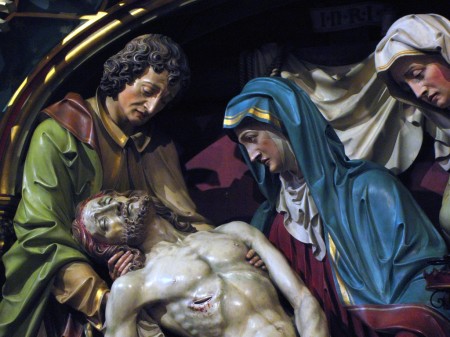Just one day before the 35th G8 summit in the earthquake-torn town of L’Aquila, Italy, the Holy See released the third encyclical of Pope Benedict XVI. who will meet with US President Obama on Friday.

Being the Holy Father’s first social encyclical, the 144-page “Caritas in Veritate” profoundly examines the depraved morals of market economy, the inhuman side-effects of globalization, consumerism and relativism, the need for a sustainable protection of the environment, the role of media and technology in modern life, the strengthening of workers’ rights and, above all, the imperative of “love and forgiveness, self-denial, acceptance of others, justice and peace”.
What might sound like old wine in new skins at first sight, is in fact a very vocal, if not trenchant call for – finally – “change we can believe in”, as Obama would probably put it. And since the world is in dramatic flux, new instruments to tackle today’s uncertainties need to be developed, such as a “true world political authority”.
“In the face of the unrelenting growth of global interdependence, there is a strongly felt need, even in the midst of a global recession, for a reform of the United Nations Organization, and likewise of economic institutions and international finance, so that the concept of the family of nations can acquire real teeth. One also senses the urgent need to find innovative ways of implementing the principle of the responsibility to protect and of giving poorer nations an effective voice in shared decision-making. This seems necessary in order to arrive at a political, juridical and economic order which can increase and give direction to international cooperation for the development of all peoples in solidarity. To manage the global economy; to revive economies hit by the crisis; to avoid any deterioration of the present crisis and the greater imbalances that would result; to bring about integral and timely disarmament, food security and peace; to guarantee the protection of the environment and to regulate migration: for all this, there is urgent need of a true world political authority, as my predecessor Blessed John XXIII indicated some years ago. Such an authority would need to be regulated by law, to observe consistently the principles of subsidiarity and solidarity, to seek to establish the common good, and to make a commitment to securing authentic integral human development inspired by the values of charity in truth. Furthermore, such an authority would need to be universally recognized and to be vested with the effective power to ensure security for all, regard for justice, and respect for rights. Obviously it would have to have the authority to ensure compliance with its decisions from all parties, and also with the coordinated measures adopted in various international forums. Without this, despite the great progress accomplished in various sectors, international law would risk being conditioned by the balance of power among the strongest nations. The integral development of peoples and international cooperation require the establishment of a greater degree of international ordering, marked by subsidiarity, for the management of globalization. They also require the construction of a social order that at last conforms to the moral order, to the interconnection between moral and social spheres, and to the link between politics and the economic and civil spheres, as envisaged by the Charter of the United Nations.”
For all of this, the Church “does not have technical solutions to offer”, the Pope insists, however, she has “a mission of truth to accomplish [… for] a society that is attuned to man, to his dignity, to his vocation”.
Today, maybe more than ever, this mission is of highest political impact.

